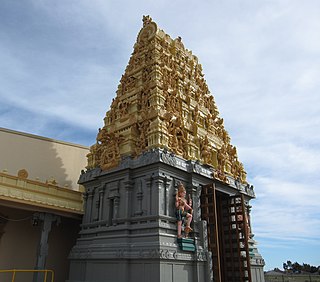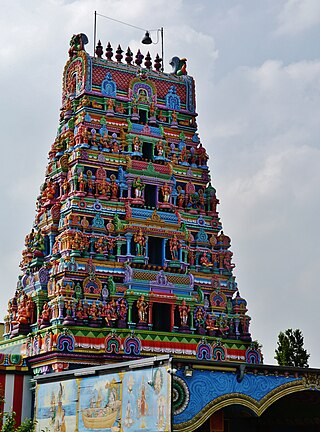
Hinduism is a minority religion in South America, which is followed by even less than 1% of the total continent's population. Hinduism is found in several countries, but is strongest in the Indo-Caribbean populations of Guyana and Suriname. There are about 320,000 Hindus in South America, chiefly the descendants of Indian indentured laborers in the Guianas. There are about 185,000 Hindus in Guyana, 120,000 in Suriname, and some others in French Guiana. In Guyana and Suriname, Hindus form the second largest religion and in some regions and districts, Hindus form the majority. Though in recent times, due to influence of Hindu culture the number of Hindus converts have increased in other countries in South America, including Brazil, Argentina, Venezuela and others.

Hinduism has been present in the form of ancient Hinduism or Vedic religion in other parts of the Middle East and influenced the Zoroastrianism and Manichaeism in ancient Persia. Krishna, one of the avatars of Vishnu and prominent Hindu deity, figures prominently in some of religions in the region.

Hinduism is the third largest religion in Australia consisting of more than 684,002 followers, making up 2.7% of the population as of the 2021 census. Hinduism is the fastest growing religion in Australia mostly through immigration. Hinduism is also one of the most youthful religions in Australia, with 34% and 66% of Hindus being under the age of 14 and 34, respectively.

Hinduism is the fourth-largest religion in Malaysia. About 1.97 million Malaysian residents are Hindus, according to 2020 Census of Malaysia. This is up from 1.78 million in 2010.

Hinduism is the fourth-largest religion in Myanmar, being practised by 1.7% of the population of Myanmar. Hinduism is practised by about 890,000 people in Myanmar, and has been influenced by elements of Buddhism, with many Hindu temples in Myanmar housing statues of the Buddha. There is a sizable population of Hindus with the Myanmar Tamils and minority Bengali Hindus having the biggest population share.

Hinduism is a minor religious faith in Finland.

Hinduism is one of Sri Lanka's oldest religions, with temples dating back over 2,000 years. As of 2011, Hindus made up 12.6% of the Sri Lankan population. They are almost exclusively Tamils, except for small immigrant communities from India and Pakistan.

The Tamil diaspora refers to descendants of the Tamil speaking immigrants who emigrated from their native lands in the southern Indian subcontinent to other parts of the world. They are found primarily in Malaysia, Arab states of the Persian Gulf, South Africa, North America, Western Europe, and Singapore. It can be divided into two main diasporic clusters, due to geographical, historical and cultural reasons, as Indian Tamil diaspora and Sri Lankan Tamil diaspora.

Hinduism is a minority religion in Japan mainly followed by the Indian, Sri Lankan and Nepali expatriate residents of Japan, who number about 166,550 people as of 2022. It's also widely integrated into the native Shinto-Buddhist religion which has had a significant impact on Japanese culture; Buddhism being an Indian religion is largely related to Hinduism, and most of its cultural practices are similar to those found in Hinduism.

Hinduism is the third-largest religious group in the United Kingdom, after Christianity and Islam; the religion is followed by over one million people representing around 1.6% of the total population. According to the 2021 United Kingdom census Hindus are primarily concentrated in England, particularly in Greater London and the South East, with just under 50,000 Hindus residing in the three other nations of the United Kingdom. Hindus have had a presence in the United Kingdom since the early 19th century, as at the time India was part of the British Empire. Many Indians in the British Indian Army settled in the United Kingdom of Great Britain and Northern Ireland.

Hindu religion and culture in Singapore can be traced to the 7th century AD, when Temasek was a trading post of Hindu-Buddhist Srivijaya empire. A millennium later, a wave of immigrants from southern India were brought to Singapore, mostly as coolies and indentured labourers by the British East India Company and colonial British Empire. As with Malay peninsula, the British administration sought to stabilise a reliable labour force in its regional plantation and trading activities; it encouraged Hindus to bring family through the kangani system of migration, settle, build temples and segregated it into a community that later became Little India.

Hinduism is a minority religion in France that is followed by more than 121,312 people in France, which is nearly 0.2% of the nation's population. Most of the Hindus in France are mainly from the Sri Lankan Tamil diaspora and the Indian diaspora, though there are many Hindus from Nepal, Afghanistan, Mauritius and other nations. There are also Hindus who are citizens of France

The Sri Lankan Tamil diaspora refers to the global diaspora of Sri Lankan Tamil origin. It can be said to be a subset of the larger Sri Lankan and Tamil diaspora.

Hinduism is the fourth-largest religion in Germany. It is practised by around 0.1% of the population of Germany. As of 2017, there were approximately 130,000 Hindus living in the country.

Hinduism is a minority religion practised by 0.6% of the population of Switzerland. Approximately 90% of Hindu adherents are foreign-born, and about a third of them have the status of refugee or asylum seeker. The Sri Sivasubramaniar Temple, located in the Sihl Valley in Adliswil, is the most famous and oldest Hindu temple in Switzerland, the Arulmihu Sivan Temple located in Glattbrugg is dedicated to Shiva, and the latest foundation is the Sri Vishnu Thurkkai Amman Temple in Dürnten in 2010.

Hinduism in Réunion constitutes a significant part of the island's population. The island of Réunion is home to approximately 200,000 Indian descendants amongst the roughly 800,000 strong population. Estimates of practicing Hindus vary from 10.7% to 14.7%. Yet, uncertainty as to the exact number of Hindus in the country results from the fact that ethnic and religious questions are forbidden in French censuses and members of the Indian population sometimes cross-identify with Roman Catholic and Hindu faiths.

There are about 13,871 Hindus in Norway as of November 2024. The majority of Norwegian Hindus are of South Asian descent with around 50% of those being ethnic Tamil Hindus from Sri Lanka.

Hinduism is a minority faith in Nigeria. Hinduism spread to Nigeria primarily through the arrival of Hindus from India and by way of ISKCON. Sindhis were the first to arrive in Nigeria in the early part of the nineteenth century. Most of the ethnic Nigerian Hindus were converted to Hinduism by the works of ISKCON.

Hinduism is a minority religion in Sweden practised by 0.13% of the population or 13,000 people out of a population of 10.5 million. Hinduism is practised mainly by persons of Indian origin and non-resident Indians together. A majority of them are Tamils, Punjabis, Bengalis, Gujaratis, Telugu's and Kannadigas.

Hinduism is a minority religion in Scotland. A significant number of Hindus settled there in the second half of the 20th century. At the time of the 2001 UK Census, 5,600 people identified as Hindu, which equated to 0.1% of the Scottish population and was slightly above the number of Hindus in Wales. In the 2011 Census, the number of Hindus in Scotland almost tripled to over 16,000 adherents. In the 2022 census, this number nearly doubled to just under 30,000 Hindus, representing about 0.6% of the population in Scotland.
















